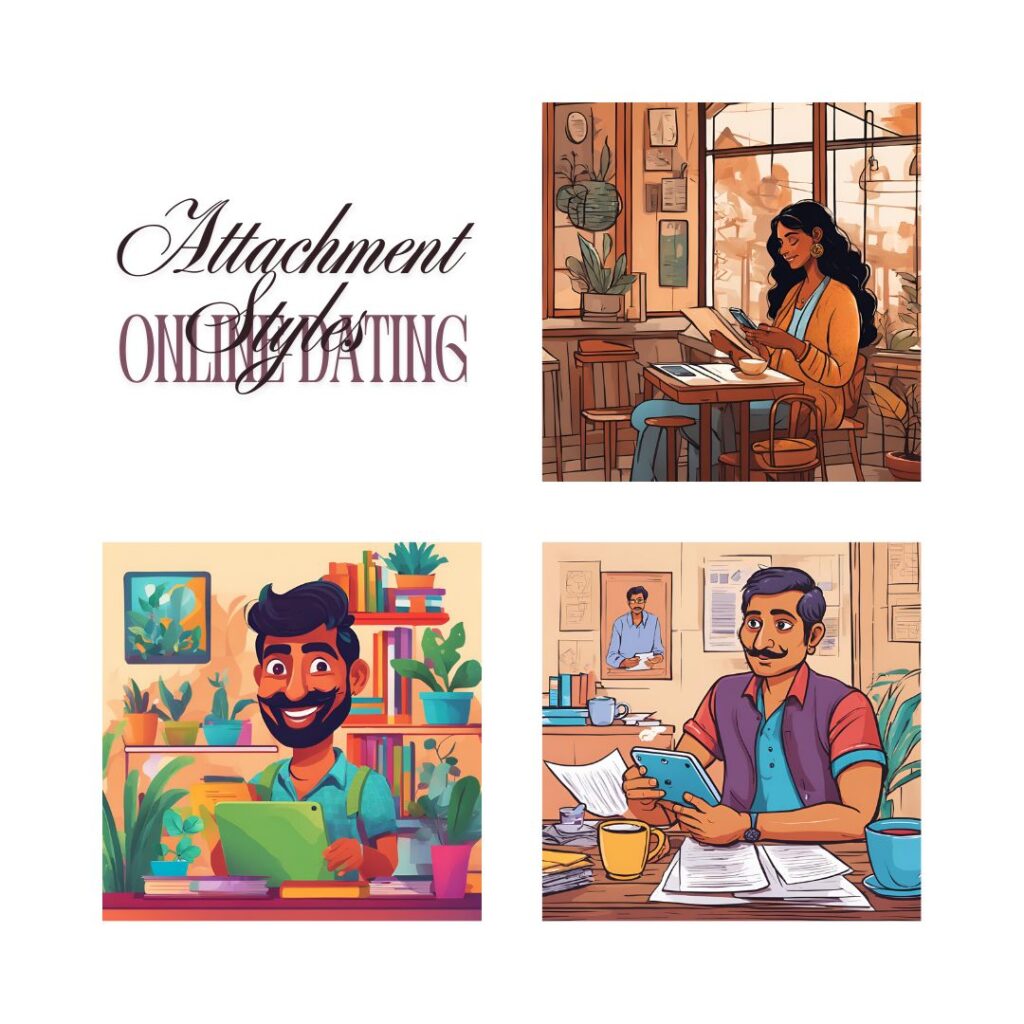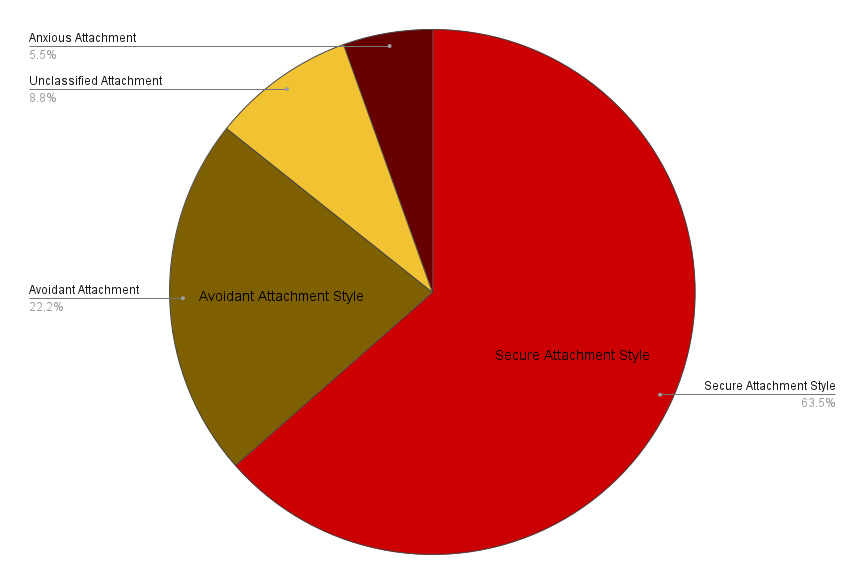
Attachment types and online dating behaviour. Image created using AI
Attachment Theory and Online Dating Behaviour
“I can never find any good matches online. Most of them would start using vulgar language after initial chats or are too timid to move beyond the chatting stage,” complains Ziva, a fashion designer from Hyderabad to the Rematch personnel. Ziva is not alone. Users all over the world mention not finding right matches on dating and relationship apps.
In a previous blog, we detailed how your attraction style impacts your relationships. In this article, we will see how Attachment theory and online dating are connected. The internet has been full of noise in recent years with regards to Attachment theory. Attachment theory provides one explanation as to why online dating does not work for some people. The theory, developed by John Bowlby and later expanded by Mary Ainsworth, states that early interactions with caregivers shape an individual’s approach to relationships throughout life.
This framework is particularly insightful in the context of online dating, where digital communication intersects with ingrained attachment styles. Understanding how attachment theory applies to online dating explains why individuals behave differently in virtual romantic settings. This in turn illuminates how these behaviours influence relationship outcomes.
I can never find any good matches online. Most of them would start using vulgar language after initial chats or are too timid to move beyond the chatting stage.
Ziva, fashion designer, Hyderabad
Overview of Attachment Theory
Attachment theory identifies three primary attachment styles: secure, anxious, and avoidant. Securely attached individuals typically feel comfortable with intimacy and trust in relationships. Anxiously attached individuals often seek excessive closeness and validation, fearing abandonment. Avoidantly attached individuals give priority to independence and may resist emotional closeness.
A fourth style, known as disorganised attachment, encompasses individuals who display conflicting behaviours, stemming from trauma or inconsistent caregiving. “These attachment styles are not rigid categories but rather tendencies that influence how people understand and respond to relationship dynamics,” states Kamal, our in-house relationship and dating expert.

The pie chart shows the percentages of various attachment styles among adults in a study by Meng & others (2015).
Online Dating and Its Unique Dynamics
Online dating platforms like Tinder, Bumble, and Hinge revolutionised romantic interactions, allowing people to connect across vast distances. However, the digital nature of these interactions brings with it unique challenges and opportunities that interact with our attachment styles in important ways.
Access to a Large Pool of Potential Partners: Online dating offers access to numerous potential partners, which can be both empowering and overwhelming. Securely attached individuals navigate these platforms with confidence, focusing on meaningful connections. In contrast, anxiously attached individuals may feel heightened stress due to the constant comparison with other users and fear of rejection. Avoidant individuals may use the breadth of options to avoid committing to any one person. “Getting above 45 likes on the dating platform was euphoric at first. But the novelty wore off soon. I found it difficult to concentrate on even one good match and gave up,” mentions Gaya, a lawyer from Madurai.
Text-Based Communication: The reliance on text-based communication in online dating magnifies the influence of attachment styles. Secure individuals communicate clearly and effectively, creating trust and connection. Anxiously attached individuals might overanalyse text messages, leading to misinterpretations and heightened emotional responses. Avoidant individuals might prefer text over face-to-face interaction, as it allows them to maintain emotional distance.
Ghosting and Rejection: Ghosting is a common phenomenon in online dating. It is the sudden cessation of communication without explanation. “I have not been ghosted online, but my friends frequently complain that I ghost them occasionally,” Mithun, a digital marketer from Bengaluru, mentioned with a twinkle in his eye. Anxiously attached individuals often struggle the most with ghosting, experiencing intense feelings of rejection and abandonment. Avoidant individuals may find ghosting an easier alternative to confrontational breakups, further perpetuating a cycle of hurt and avoidance.
How Attachment Styles Shape Online Dating Behaviours
Secure individuals are more likely to approach online dating with realistic expectations and a balanced perspective. They are generally comfortable expressing their needs and responding to others’ needs, which fosters healthy communication and reduces misunderstandings. These individuals are less likely to engage in behaviours such as breadcrumbing (sending intermittent signals of interest to keep someone’s attention without genuine intent).
People with an anxious attachment style often experience heightened emotional reactivity in online dating scenarios. They may send frequent messages, seek constant reassurance, and overthink delays in responses. Their fear of abandonment can make them vulnerable to manipulation or exploitation, particularly in a space where intentions are not always clear.
Avoidantly attached individuals begin online dating with caution, paying importance to autonomy over connection. They might engage in casual conversations but avoid deep emotional engagement. While they may enjoy the initial thrill of matches, they are more likely to disengage if the relationship becomes too demanding or intimate.
“Those with a disorganised attachment style may display a mix of anxious and avoidant tendencies. They might simultaneously seek closeness and fear it, leading to unpredictable online dating behaviours. For instance, they might initiate intense conversations only to withdraw abruptly,” adds Kamal.
Implications for Online Dating Success
The intersection of attachment theory and online dating has practical implications for improving relationship outcomes. “Recognising one’s attachment style can lead to greater self-awareness and more intentional dating behaviours,” explains Kamal.
Self-Awareness and Growth: Understanding attachment styles allows individuals to address maladaptive or inappropriate behaviours. Anxiously attached individuals can work on self-soothing techniques, while avoidant individuals can practise vulnerability and openness.
Setting Boundaries: Securely attached individuals are more likely to establish and respect boundaries, a critical skill in online dating. “He would message every day with some trauma he had faced that day or in the past. I felt like I was his therapist rather than an online match,” mentioned Yamini, a fitness trainer from Chennai, about one of the matches she had met online. She broke off with this match due to his clingy behaviour. Developing the skill to maintain adequate boundaries can benefit individuals with other attachment styles as well.
Communication Strategies: Adapting one’s communication styles to account for attachment tendencies can increase healthier interactions. For instance, being direct and reassuring can help ease the anxieties of an anxiously attached partner. “One of the matches I made was a very shy woman. I had to be very careful and had to take things slowly. It worked. She’s moving to my town and meeting my parents next week,” said Naveen, a business owner in Thiruvananthapuram.
The Role of Technology and Algorithms
Online dating platforms are increasingly depending on algorithms to improve matchmaking. While these algorithms prioritise shared interests and demographics, incorporating psychological insights such as attachment styles could enhance their effectiveness. For example, pairing individuals with complementary attachment tendencies might reduce conflict and promote compatibility.
Moreover, relationship apps should integrate tools for self-reflection, such as quizzes to identify attachment styles and personalised tips for navigating online dating. These features would empower users to make informed decisions and make healthier connections. Keeping this in mind, Rematch uses a psychometric matching algorithm during the sign-in process. Read our blog on psychometric matching for more information.
Challenges and Limitations
While attachment theory provides valuable insights, it is essential to consider its limitations in the context of online dating. For instance, attachment styles are not fixed traits but patterns that can evolve over time and across relationships. Additionally, online dating behaviours are influenced by myriad factors, including personality traits, cultural norms, and situational contexts, which may not always align neatly with attachment theory.
Attachment Theory and Online Dating: Conclusion
Attachment theory offers a powerful lens for understanding the complexities of online dating.
“There is no doubt the attachment styles influence online dating behaviour,” reiterates Kamal, relationship expert. By shaping individuals’ expectations, communication styles, and emotional responses, attachment styles play a vital role in digital romantic interactions. Greater awareness of these dynamics can lead to healthier and more fulfilling online dating experiences. As technology continues to evolve, integrating psychological insights into dating platforms will change how people connect and build relationships in the digital age.
Therefore, step back from your online dating or relationship app and evaluate if you are jeopardizing your dating and relationship experience through your attachment style. Download the Rematch app and fill in the questionnaire to match with someone who matches your attachment style and preferences.
There is no doubt the attachment styles influence online dating behaviour.
Kamal, Relationship and dating expert
Bibliography
Ainsworth, Mary D. S., Mary C. Blehar, Everett Waters, and Sally Wall. Patterns of Attachment: A Psychological Study of the Strange Situation. Lawrence Erlbaum, 1978.
Birnbaum, Gurit E. “Attachment Orientations and Online Dating.” Current Opinion in Psychology 25 (2018): 134-39.
Bowlby, John. A Secure Base: Parent-Child Attachment and Healthy Human Development. Basic Books, 1988.
Hazan, Cindy, and Phillip Shaver. “Romantic Love Conceptualized as an Attachment Process.” Journal of Personality and Social Psychology 52, no. 3 (1987): 511-24.
Meng, X., D’Arcy, C., and Adams, G. C. “Associations between Adult Attachment Style and Mental Health Care Utilization: Findings from a Large-Scale National Survey.” Psychiatry Research 229, no. 1-2 (2015): 454-461.
Timmermans, Elisabeth, and Elien De Caluwé. “To Tinder or Not to Tinder, That’s the Question: An Individual Differences Perspective to Tinder Use and Motives.” Personality and Individual Differences 110 (2017): 74-79.

